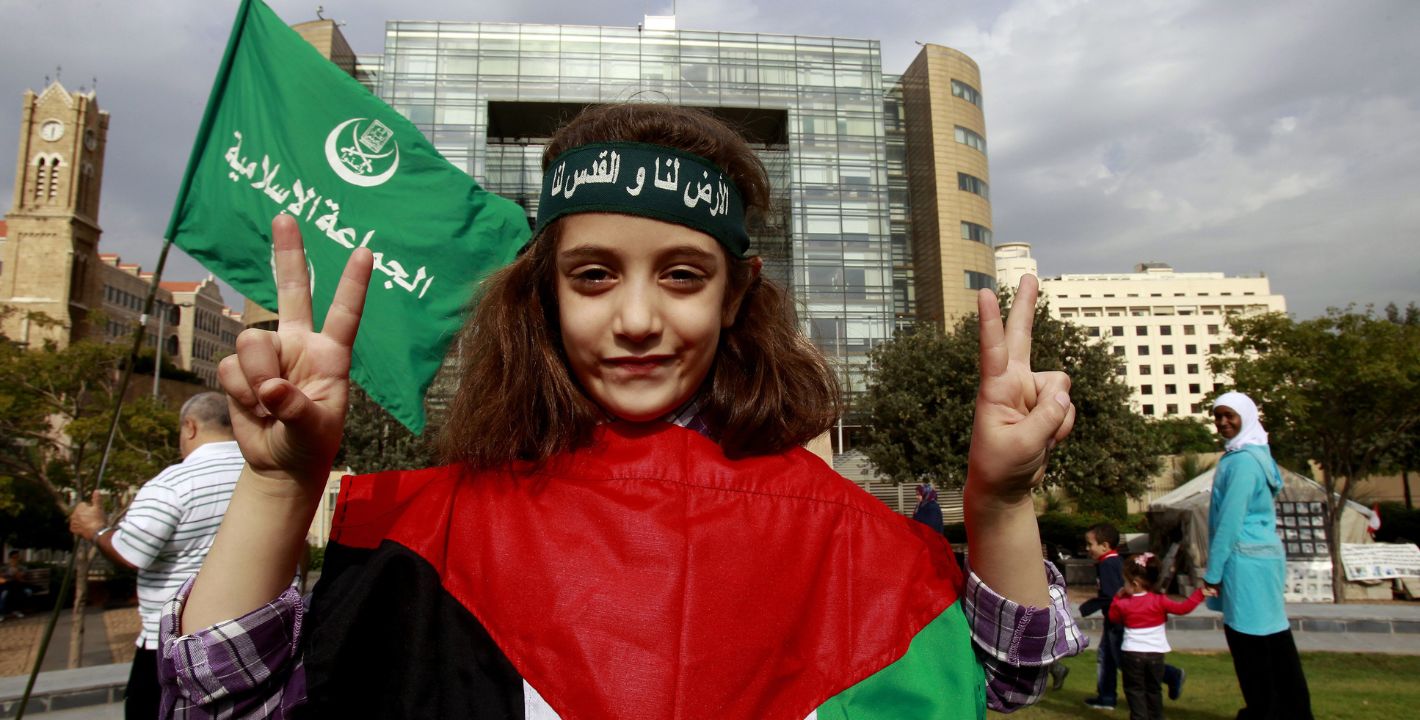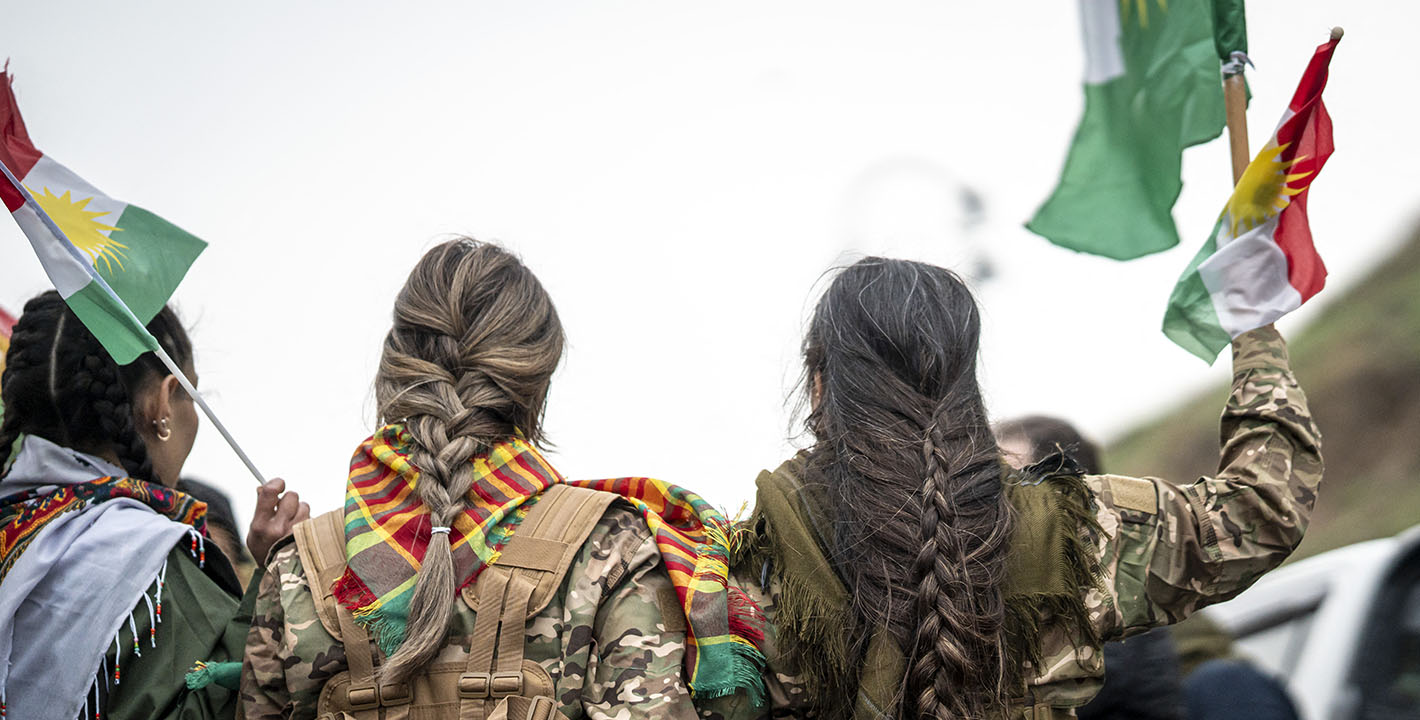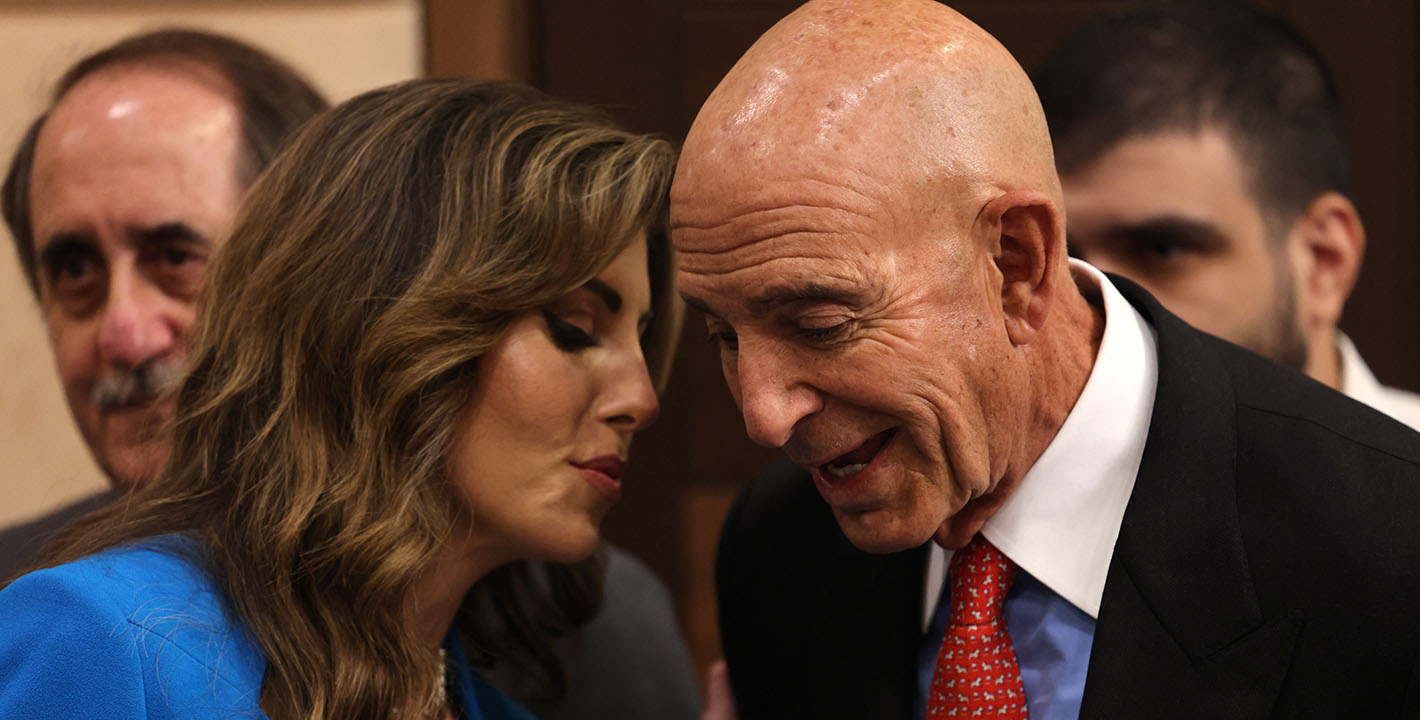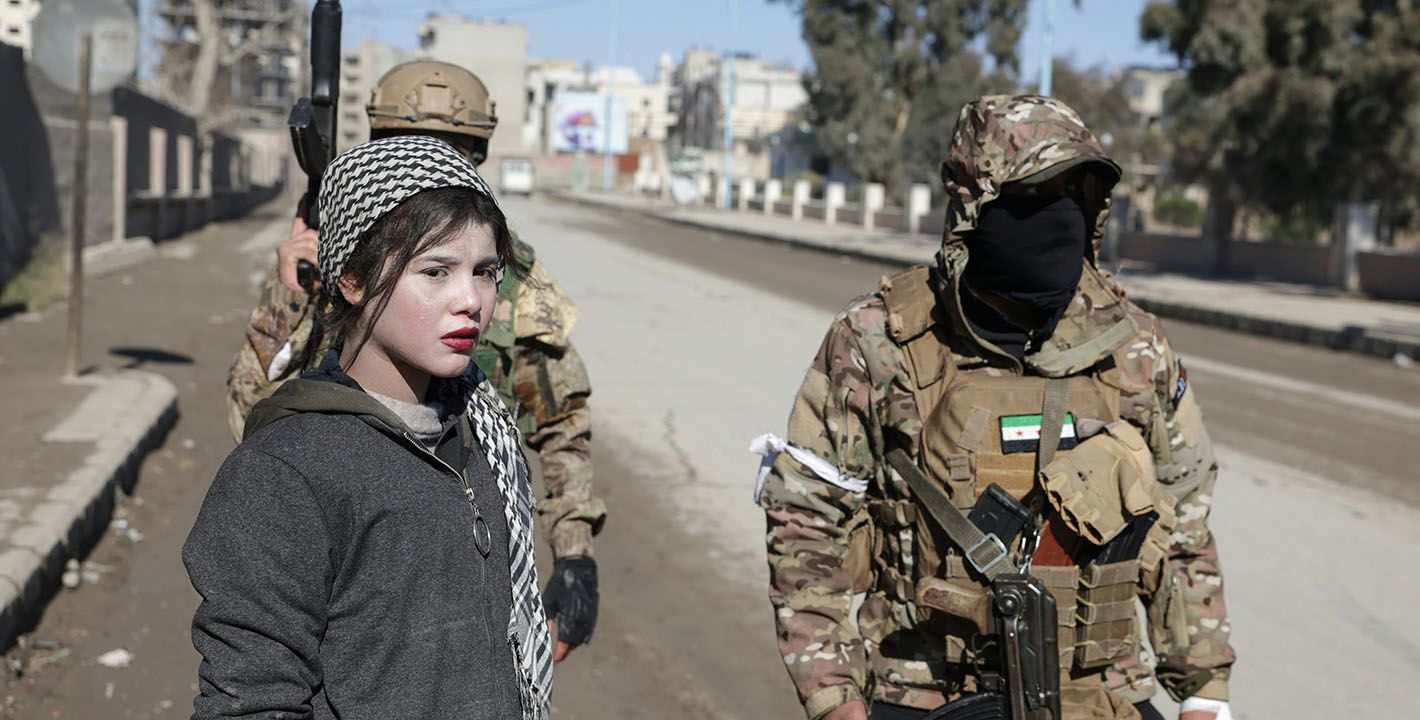Michael Young
{
"authors": [
"Michael Young"
],
"type": "commentary",
"blog": "Diwan",
"centerAffiliationAll": "dc",
"centers": [
"Carnegie Endowment for International Peace",
"Malcolm H. Kerr Carnegie Middle East Center"
],
"collections": [
"Decoding Lebanon"
],
"englishNewsletterAll": "menaTransitions",
"nonEnglishNewsletterAll": "",
"primaryCenter": "Malcolm H. Kerr Carnegie Middle East Center",
"programAffiliation": "MEP",
"programs": [
"Middle East"
],
"projects": [],
"regions": [
"Levant",
"Lebanon",
"Middle East",
"Western Europe",
"France"
],
"topics": [
"Political Reform"
]
}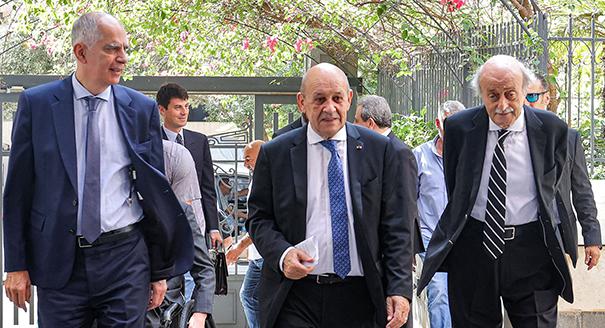
Source: Getty
Beirut Will Always Have Paris
French envoy Jean-Yves Le Drian is wondering why some Lebanese parties reject a dialogue over a new president; fear may be a reason.
Jean-Yves Le Drian is in Beirut and one issue puzzling him is why there is such hostility to an inter-Lebanese dialogue over the presidency from opposition parliamentary blocs, above all the Lebanese Forces. Opposition groups reacted strongly to Le Drian’s recent request that they describe the kind of candidate they were looking for. Lebanese Forces leader Samir Geagea followed this up with a refusal to engage in discussions with Hezbollah, saying he saw no benefit in “wasting additional time on a dialogue that will not lead anywhere.”
Since August 2020, France has been so heavily implicated in Lebanese affairs that critics have said President Emmanuel Macron has lost much of his credibility in the process. Macron traveled to Beirut soon after the explosion at Beirut port in August 2020 and tried to kickstart economic reform by helping to put in place what he called “a mission-focused government.” He returned in September and met with the country’s major political forces, who reportedly all assured him at a dinner at the French ambassador’s residence that they too embraced such an outcome.
Soon things fell apart, however, when the man chosen to form a government, Mustapha Adib, threw in the towel. Paris blamed the United States, pointing out that during the government-formation process the Americans sanctioned two former ministers, Ali Hassan al-Khalil and Yusif Fenianos, which brought everything to a halt. For the French, this was a deliberate effort by Washington to torpedo their initiative. Khalil is a leading aide to the parliament speaker Nabih Berri and Fenianos was the first Christian to be sanctioned by the United States. In other words, Washington seemed to be widening the scope of its villains.
I have some doubts about the accuracy of the French interpretation. Shortly before the sanctions came down, I and two other people met with the then U.S. assistance secretary of state for Near Eastern affairs, David Schenker, whom we all knew as a friend before his posting. Schenker hinted at the imminent imposition of new sanctions, saying these would cover a category of individuals not sanctioned previously. He did not name names, however, and in response to my question about how this would affect the French initiative, Schenker didn’t really seem to draw a connection between the American and French moves. He did state, however, that Washington wasn’t trying to undermine France’s efforts.
It could be that the Americans really did not see what impact the sanctions would have, nor how they would be seized upon by a Lebanese political class that was unenthusiastic with the French initiative. If that’s the case, and the interpretation may be a charitable one, they were at the very least guilty of deeply misreading the situation in Lebanon. Perhaps French officials themselves should also have been better prepared for the sanctions that blindsided them, insofar as Schenker was in regular touch with his French counterparts. Then again, it would also be naïve to ignore that the Americans were not overly keen to see Paris succeed in an initiative that, more than anything else, sought to secure Hezbollah’s approval.
That was not enough to calm French ardor. Since then, Macron has continued to play a central role in regional and international endeavors to place Lebanon on a path to reform, and more recently to elect a president to succeed Michel Aoun. Familiarity breeds contempt, evidently, which is why the Lebanese have gradually become more skeptical, and critical, of the French president’s efforts. But that doesn’t change the reality that Lebanon gains tremendously from having a major Western leader expend his political capital on behalf of a dysfunctional country that offers very little in exchange.
Certainly, the French erred in their early proposal that a quid pro quo be worked out, whereby Suleiman Franjieh would be elected president in exchange for Nawaf Salam being appointed prime minister. What made this doubly unacceptable to the Maronite parties was that such an equation left them out of the discussion over the presidency, despite the fact that the office is reserved for Maronites! The initial proposal for an exchange was effectively floated by Hezbollah itself, through the journalist Ibrahim Amin in an article in Al-Akhbar in November 2022. The Salam proposal was designed to appeal to Saudi Arabia. So, effectively, what the Maronites saw was that France had embraced a Hezbollah idea, in which the president would be chosen by the party and the prime minister by the Saudis. No one, it seemed, cared the least about what Maronite political representatives wanted.
However, facing a unified rejection of Franjieh by the Maronite parties and their support for Jihad Azour as an alternative, the French appear to have abandoned the Franjieh proposal. Hezbollah also must have realized that it could not impose Franjieh on a resentful Maronite community. This should have been a sound basis for talks between the Maronite parties and Hezbollah. It’s not surprising, then, that Le Drian proposed a national dialogue on the presidency, before shifting tack and calling for consultations. Yet somehow this idea was transformed by the opposition into the equivalent of an unconditional surrender (though at least one party is reported to have changed its mind since). Rather than interpreting Hezbollah’s willingness to talk as a sign that the party might be open to abandoning Franjieh, opposition groups have insisted that its acceptance of dialogue is merely a ploy to impose Franjieh. Their argument? That Hezbollah has not abandoned Franjieh yet, showing ill will. This view is absurd. Hezbollah will hold onto Franjieh until it receives an enticing counter-offer. That’s negotiations 101.
Which takes us back to Le Drian’s puzzlement. The opposition parties were among those that managed to block the election of Suleiman Franjieh, so they must have known that the next step would be negotiations over a compromise candidate. Which leads us to wonder why Geagea hesitates to enter into such discussions now. There are three possibilities. The first is that he prefers to negotiate through third parties, such as Walid Joumblatt, in order to retain a margin of tactical maneuver for himself. The second is that Geagea knows that Franjieh’s foes are divided, so that talks might allow Hezbollah to exploit their rifts and make major gains. And the third is that Geagea realizes he’s isolated, so that he gains by maintaining a vacuum in the presidency and railing against Hezbollah, which permits him to garner Maronite approval and compensate for his lack of allies.
Each of these reasons may be correct on its own, just as all of them might be. Or perhaps none is. But don’t blame Jean-Yves Le Drian or the French in general for failing to pick up on their Lebanese interlocutors’ inconsistencies. Dialogue is not defeat, especially when Hezbollah’s opponents won the first round and blocked Franjieh. Nothing is achieved in Lebanon without a dialogue, and if the French are offering to provide a framework, then it makes no sense to condemn them for taking time on a country that literally grinds down the time of others.
About the Author

Editor, Diwan, Senior Editor, Malcolm H. Kerr Carnegie Middle East Center
Michael Young is the editor of Diwan and a senior editor at the Malcolm H. Kerr Carnegie Middle East Center.
- Axis of Resistance or Suicide?Commentary
- Iran and the New Geopolitical MomentCommentary
Michael Young
Recent Work
Carnegie does not take institutional positions on public policy issues; the views represented herein are those of the author(s) and do not necessarily reflect the views of Carnegie, its staff, or its trustees.
More Work from Diwan
- Axis of Resistance or Suicide?Commentary
As Iran defends its interests in the region and its regime’s survival, it may push Hezbollah into the abyss.
Michael Young
- The Jamaa al-Islamiyya at a CrossroadsCommentary
The organization is under U.S. sanctions, caught between a need to change and a refusal to do so.
Mohamad Fawaz
- Kurdish Nationalism Rears its Head in SyriaCommentary
A recent offensive by Damascus and the Kurds’ abandonment by Arab allies have left a sense of betrayal.
Wladimir van Wilgenburg
- A Mechanism of CoercionCommentary
Israeli-Lebanese talks have stalled, and the reason is that the United States and Israel want to impose normalization.
Michael Young
- All Eyes on Southern SyriaCommentary
The government’s gains in the northwest will have an echo nationally, but will they alter Israeli calculations?
Armenak Tokmajyan


